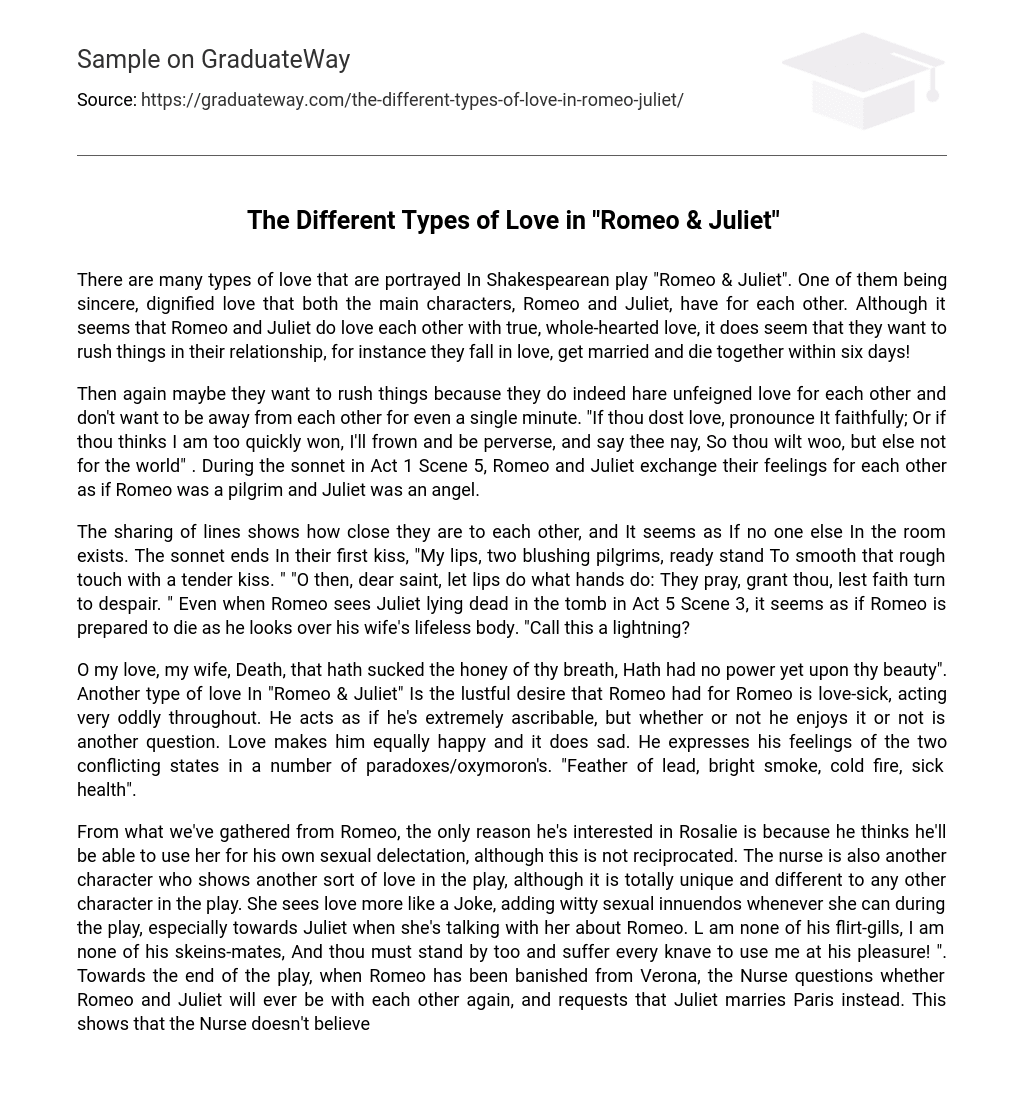Within the Shakespearean play “Romeo & Juliet,” various types of love are depicted, including a genuine and honorable affection shared between the protagonists, Romeo and Juliet. While it is evident that Romeo and Juliet possess a deep, authentic love for one another, their relationship appears to be characterized by haste. Within a mere six days, they swiftly fall in love, commit to marriage, and ultimately meet their tragic demise together.
Then again perhaps they are rushing things because they genuinely love each other and don’t want to be apart for even a moment. “If you love me, say it sincerely; or if you think I am easily won, I will frown and be difficult, and reject you, so you will have to woo me but not for anything in the world.” During the sonnet in Act 1 Scene 5, Romeo and Juliet express their feelings for each other as if Romeo were a pilgrim and Juliet were an angel.
The closeness between the characters is evident through the sharing of lines, creating an atmosphere where no one else in the room seems to exist. The sonnet concludes with their first kiss, described as “My lips, two blushing pilgrims, ready stand to smooth that rough touch with a tender kiss.” “O then, dear saint, let lips do what hands do: They pray, grant thou, lest faith turn to despair.” Even when Romeo discovers Juliet lying lifeless in the tomb in Act 5 Scene 3, it appears that he is willing to die while gazing at his deceased wife. “Call this a lightning?
In “Romeo & Juliet,” Romeo expresses his love for his wife, saying, “O my love, my wife, Death, that hath sucked the honey of thy breath, Hath had no power yet upon thy beauty.” However, another type of love seen in the play is Romeo’s lustful desire. He is love-sick and acts strangely. He appears both happy and sad due to love, expressing his conflicting emotions through paradoxes and oxymorons such as “Feather of lead, bright smoke, cold fire, sick health.”
Based on Romeo’s comments, his attraction to Rosalie is solely driven by his desire for sexual pleasure, even though she does not reciprocate these feelings. The Nurse, on the other hand, demonstrates a unique perspective on love in the play. She treats love as a joke and consistently makes witty sexual references, particularly when discussing Romeo with Juliet. She states, “I am none of his flirt-gills, I am none of his skeins-mates, And thou must stand by too and suffer every knave to use me at his pleasure!” Towards the end of the play, after Romeo is banished from Verona, the Nurse questions whether Romeo and Juliet will ever reunite and advises Juliet to marry Paris instead. This reveals that the Nurse does not believe in true, genuine love, but rather in lust and deceit. She lacks moral values, leading me to believe that she may have never been faithful to one man before.
When she was younger, she always sought out quick solutions. Another character in Romeo & Juliet who demonstrates various forms of love and emotion is Lord Caplet, Juliet’s father. Initially, he displays his affectionate and worried side by insisting that Juliet marry his close friend, Paris, in two summers. “She hath not seen the change of fourteen years; Let two more summers wither in their pride.” However, Lord Caplet undergoes a transformation from a loving and caring father to what can be described as a “dictator,” as he claims that Juliet is his possession.
After Juliet refuses to marry Paris, her father becomes angry because she is deeply in love with Romeo. However, towards the end of the play, he also expresses sadness when Juliet commits suicide. In grief, he exclaims, “O heavens! O wife, look how our daughter bleeds! Is empty on the back of Montague, And it MIS-sheathed in my daughter’s bosom!”
In summary, “Romeo & Juliet” portrays various types of love through the dialogue of its characters. The way each character speaks reveals the nature of their love, allowing us to assess their true character.





